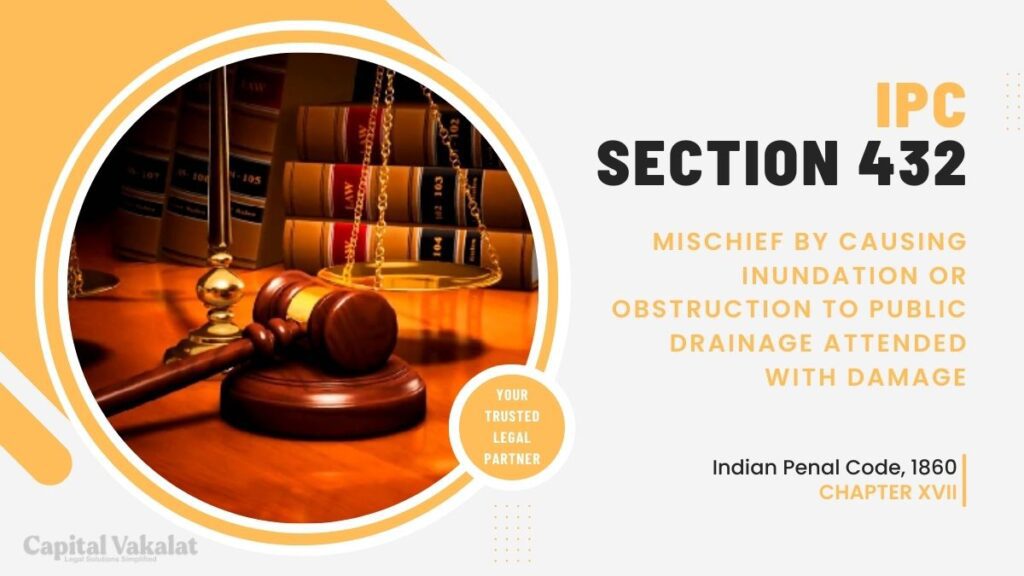The proper functioning of public drainage systems is crucial for the well-being of communities and the sustainable development of urban areas. Section 432 of the Indian Penal Code (IPC) addresses offenses related to mischief by causing inundation or obstruction to public drainage attended with damage. In this article, we delve into the intricacies of this legal provision, exploring its historical context, types of offenses covered, consequences, preventive measures, challenges in implementation, and the importance of public drainage systems.

Understanding Section 432 IPC is essential for every citizen, as it pertains to actions that can have far-reaching consequences on public infrastructure and the lives of individuals. This provision focuses on acts that cause inundation or obstruction to public drainage, resulting in damage.
Understanding Section 432 IPC
Legal Provisions
Section 432 IPC outlines the legal framework governing offenses related to public drainage. It specifies the nature of acts that constitute mischief in this context.
Definition of “Mischief by causing inundation or obstruction”
The section provides a clear definition of the offense, elucidating what actions fall under the purview of mischief causing inundation or obstruction to public drainage.
Elements Constituting the Offense
To understand the section fully, one must be acquainted with the elements that constitute the offense. This includes the intent behind the actions and the resulting damage.
Historical Context
The evolution of laws related to public drainage has a significant impact on the formulation of Section 432 IPC. Examining the historical context provides insights into the societal needs that led to the creation of such legal provisions.
Types of Offenses Covered
Mischief Causing Inundation
A detailed exploration of cases involving mischief causing inundation sheds light on the various scenarios covered by Section 432 IPC. Real-life examples illustrate the implications of such offenses.
Obstruction to Public Drainage
An examination of cases involving obstruction to public drainage helps in understanding the diverse ways in which this offense can manifest. Case studies provide a nuanced perspective.
Consequences and Penalties
Understanding the legal repercussions for offenses under Section 432 IPC is crucial. This section discusses the severity of penalties, citing relevant case studies to highlight the impact on individuals and communities.
Preventive Measures
Role of Public Awareness
Creating public awareness regarding the consequences of mischief related to public drainage is a key preventive measure. The article discusses the role of education in fostering responsible behavior.
Government Initiatives
Government initiatives aimed at preventing offenses under Section 432 IPC are explored. This includes legislative measures and infrastructure development.
Challenges in Implementation
Identifying challenges faced by law enforcement agencies in implementing Section 432 IPC is essential. Public cooperation plays a vital role, and addressing challenges requires a collaborative effort.
Case Studies
Real-life examples of instances covered under Section 432 IPC are examined in this section. These case studies illustrate the diverse situations in which offenses can occur and their impact on individuals and communities.
Importance of Public Drainage Systems
Understanding the role of public drainage systems in urban planning and environmental sustainability is crucial. This section highlights the broader implications of offenses covered under Section 432 IPC.
Conclusion
In conclusion, Section 432 IPC addresses offenses that, if unchecked, can have severe consequences on public infrastructure and the well-being of communities. It is imperative for individuals to be aware of the legal provisions and actively contribute to the prevention of such offenses.
Frequently Asked Questions
What penalties can one face for offenses under Section 432 IPC?
Penalties vary based on the severity of the offense but may include fines and imprisonment.
How can individuals contribute to preventing offenses related to public drainage?
Public awareness, responsible waste disposal, and reporting suspicious activities are effective ways for individuals to contribute.
Are there government programs addressing public drainage issues?
Yes, various government initiatives focus on infrastructure development and public awareness to prevent offenses covered under Section 432 IPC.
What should I do if I witness an offense related to public drainage?
Reporting the incident to local authorities is crucial. Additionally, documenting the situation through photos or videos can aid in investigations.